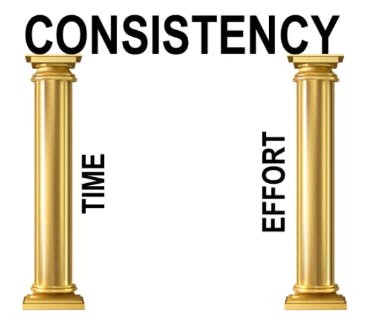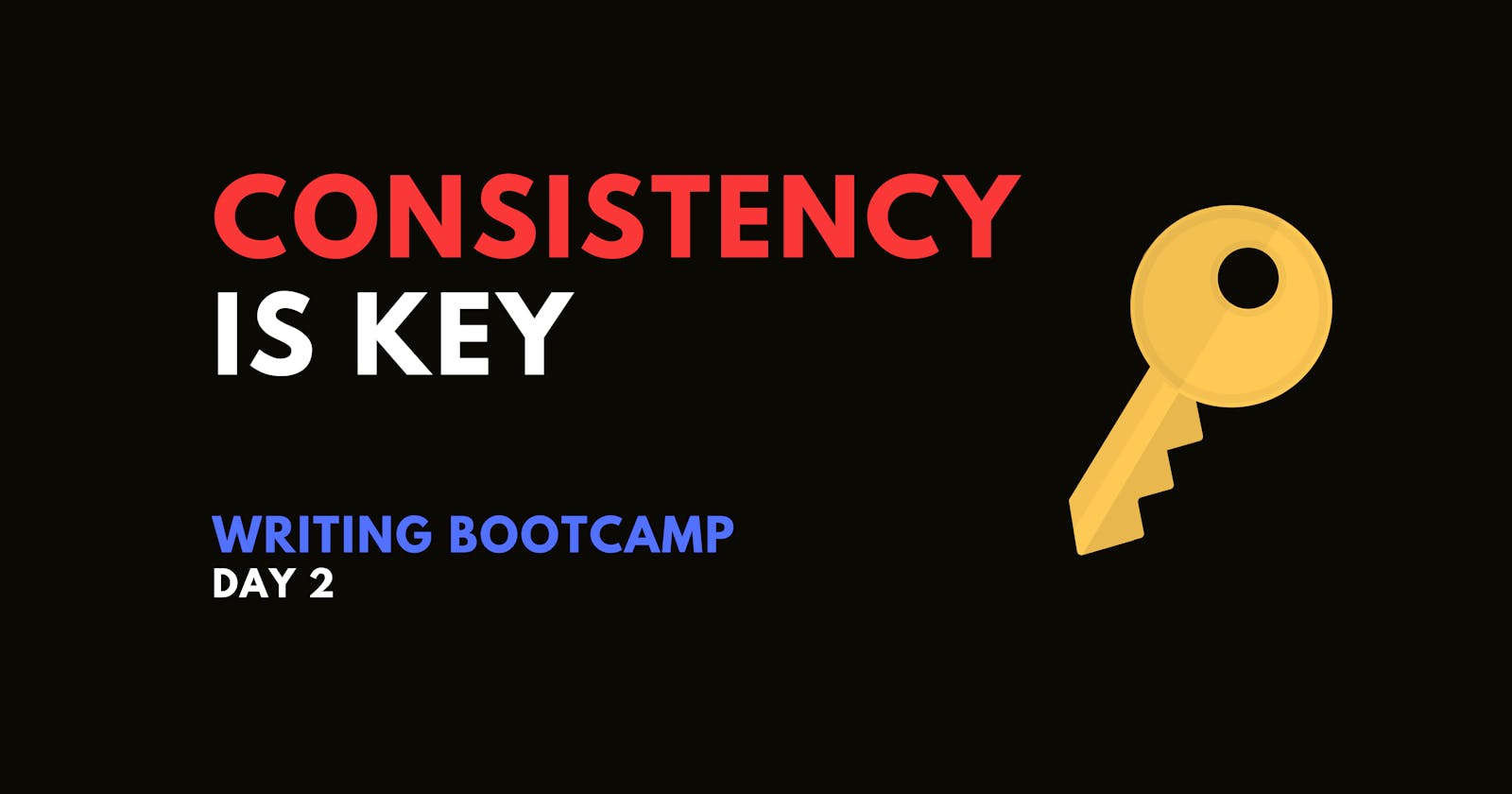Consistency Is Key - Day 2 of the Hashnode Technical Writing Bootcamp 🔑
How to Stay Consistent and Come Up With Article Ideas?
📕 This article is part of the Hashnode Technical Writing Bootcamp series.
If you missed the first bootcamp day then check out my article about it: Throw Away Your First 1 Million Words - Day 1 of the Hashnode Technical Writing Bootcamp 🚀.
The guest this time was Chris Bongers, a web developer with over 15 years of experience. He has a blog, Daily Dev Tips, where he is posting daily. He has been doing that (from what I could see) literally every single day for the last 1 year and a half.
The talk was focused around the topic of building discipline, staying consistent with writing and coming up with ideas for articles.
What Is Consistency? 📖
Consistent = Acting or done in the same way over time, especially to be fair or accurate.
So being consistent with something means to do it constantly and with no or little changes.
Why Should You Care About Consistency? 👀
Ok, we get what consistency is, but why is it important?
There are many reasons, but I'll lay out the ones I most resonated with.
Snowball Effect 🍧
As with most new things, it's harder at the beginnig. It takes some effort. But after you get the ball rolling and you build momentum they will unfold with less struggle. Once you set up a system amd build a habit, the friction will become smaller and smaller.
Parts of the action will become automatized and your energy can be focused on the creative part.
Easier For The Audience 😀
If you have a clear schedule and you stick with it, posting articles at constant intervals, let's say like the same day each week, then your audience will know when to expect new material from you.
Sometimes being predictable is not good, but in this case it is desirable. By having a predictable schedule you will transmit that you are in for the long term.
It's a marathon, not a sprint.
Freedom ✈
Some people say that having a schedule is limiting their freedom. I believe that in this case it's quite the opposite.
If you want to stick with writing then having a clear idea when you will write and how you will do it will actually give you freedom. Mental freedom.
If you know when you will write then you don't have to think about it. No more stressing about it. You will just do it.
You show up. You do the work. You live your life.
The Two Pillars 🏛
 Image from daily-dev-tips.com
Image from daily-dev-tips.com
Christ talked about consistency in the following way: you can be consistent by doing the task at the given interval you set for yourself and applying the same effort every time.
The effort and the time period is decided by you. Once you decide it you just have to stick with it.
Of course, from time to time the effort might vary, depending on the task and day, the important thing is to show up constantly.
How To Become a Consistent Writer ✍
Have a Good Reason ⭐
You should think well why you want to start writing. What's the reason for wanting to spill words on 'paper' from time to time? If it's because it's trendy and everyone has a blog then find another.
You need a powerful enough purpose to keep you going when things will get rough. There will be days when you will not feel like writing but if your intentions are based on a solid foundation then you will fight through the hardship.
Set Realistic Goals and Timeframes ✊
Realistic Goals 🎯
Setting goals is a tricky business. You can be very ambitious and try to achieve something impossible or be super conservative and set a too low bar for yourself.
You must find a balance. You need a high enough goal that challenges you and forces you to get out of your comfort zone so that you can grow but low enough such that you don't set yourself up for failure and guaranteed demoralization.
Goals That 100% In Your Control 🦞
One thing that I try to do when I'm setting a goal is to have a target that is 100% in my control and not externally motivated.
❌ Bad goal: "Reach 10K views on my blog posts"
✅ Good goal: "Post one article every week for 6 months"
The first one is motivated by external factors that you cannot control. You cannot control how many people will read your posts. Sure, you can share it aggressively on social media an convince your friends to do it, but it's still up to other people to make it happen. You are setting yourself up for dissapointment if it doesn't happen.
The second one is motivated by your own actions. It's up to you to achieve it. If people don't read your posts won't matter. The only thing that matters is that you show up every week with that awesome article. The views will come.
Timeframes 📆
Your timeframe will dictate how ofen you will write. It's important that you do it often enough to build the habit and rarely enough such that it doesn't interfere with the rest of your life, unless you want to.
A good timeframe for the beginning might be once per week. If you're more conservative then it can be once every two weeks. Or if you're more ambitious then maybe twice per week. It entirely depends on what you want to accomplish.
Plan Ahead 🌧
Make a plan for your writing. A schedule of sorts. When will you write? How much will you write? What are some topics you want to cover? Preparing will increase your chances of success.
Also, writing more articles at a time before posting the next one will give you a buffer and space to breathe. It's like a fund for rainy days.
The 10-Minute Rule ⏰
This is a rule Chris mentioned and I read a variation of it, The 2-Minute Rule, from Atomic Habits by James Clear.
The idea is that if you have a task that you don't want to do then start doing it and after 10 minutes if you want to quit then quit. No shame, no guilt, just stop it after 10 minutes.
At the beginning you might quit after 10 minutes. But after a few times you will start doing it and continue after the 10 minute mark. Once you start going you will feel like keeping going.
The hard thing is to start. Then you let the momentum carry you.
Celebrate Every Win 🏆
Writing your first article might not seem like a big accomplishment for some, but it is for you. It's the first brick in the wall. It's a win. A small win. But big wins are built from small ones along the way.
Celebrate the small wins.
Don't wait until you reach your big goal to enjoy your effort, do it as you go.
Buy yourself a cupcake, have beers with a good friend or reward yourself by finishing that side quest from Witcher 3.
Coming Up With Ideas 🥽
There are many things you could write about, but sometimes it's not so obvious. Here are some ares that can generate unlimited content ideas.
Knowledge 📜
Write about a topic you know lots about. Share your expertise with the world. Someone out there will find useful what you have to say.
Struggles 😤
Maybe you've recently struggled with something, a problem that was bugging you for days. You couldn't find a solution online so you decided to solve it yourself.
It's unlikely that you are or will be the only one struggling with it. Share your solution with the world.
Experiences 🎓
You can write about your current or past experiences.
If you are a student then you could write about your college experience, preparation for exams, admission experience, studying tips or life in general as a student.
If you're a professional you could write about life in your company, interview tips, career advices.
There are things in your life that are interesting and some people might find it insightful.
Learning 🤓
I mentioned in the first article in the series, Throw Away Your First 1 Million Words - Day 1 of the Hashnode Technical Writing Bootcamp 🚀, that you don't have to be an expert to write about something.
You can share your journey on the path of learning about a subject. You would have the close-to-the-ground insight that other people wanting to learn will appreciate and relate to.
Tools 🛠
If you have a cool setup of tools for your work that has proved effective then you can share that with others.
You could describe things like what IDEs you use, text editors, what frameworks and libraries work for you and tips to set them up and use.
Events 📅
If you've attented cool events recently you can write about what you've learned from them and key take aways (that's what I am doing right now 😁).
2 AM Thoughts 😴
If you're like me, you're always thinking about ideas. Interesting ideas, weird ideas even philosophical ideas.
If something has been on your mind for a long time and you think it is worth sharing then do it. This might spark fascinating discussions and expand the collective perspective.
Homework 📚
Select a topic for a Series and write your first entry.
I decided to do a series on Javascript, called Javascript Deep Dive 🤿. Here I will write about topics I find interesting about Javascript while I adventure deeper and deeper into the belly of the beast.
You can the first one here: Primitives: Introduction to Javascript Data Types - Part 1 🐥
Reach Out 👋
Does any of these ideas resonate with you? Let me know what you think in the comments.
You can find me on Twitter and Github
Chris has posted an article on his blog about this topic, most likely as consequence of the meeting. You can check it out here.

